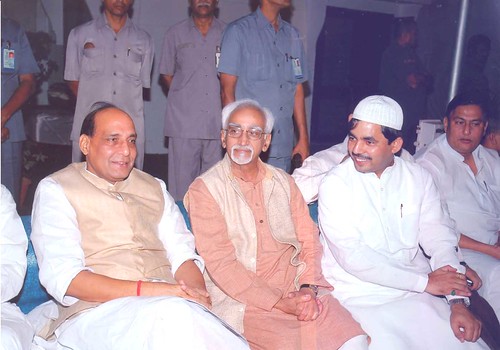By Kashif-ul-Huda, TwoCircles.net
Part 2 of UP close UP series.
Talk to Muslims about their backwardness and they will point to lack of unity and lack leadership as the main cause. They will argue that a united community can get their due share from the government and they can be united only under a leader who is from amongst them and command respects from the community.
But before we talk about Muslim leadership one needs to consider whether Indian Muslims can be considered one community. Muslims in India comes in all shapes and sizes with their own distinct history, language, culture, and even religious practices; with so much diversity can they be considered a community? I put this question to Navaid Hamid, General Secretary of Movement for the Empowerment of Muslim Indians (MOEMIN). “The pressure in which the Muslims are living in India has made them a community,” declared Hamid.
But then why this same pressure has not thrown leaders from among them? Avenues for new leadership to emerge are rather limited- political, religious, and criminals. In the past they have put their trust in criminals who claimed to be their leaders. Haji Mastan, Abdul Lateef, Dawood Ibrahim, all were once popular because of their anti-establishment image or “Robin Hood” line of work. To a certain extent Shahabuddin of Siwan and Mukhtar Ansari of Mau represent that trend today. But by and large Indian Muslims do not support criminals or criminal-politicians anymore than the larger Indian voters.
Muslim religious leadership in India has so far been interested in sectarian conflicts and comes on one platform only for religious issues or what they perceive it to be Islam-under-threat issues. Muslim-under-threat incidents do not bother them too much.
So the only hope for the Muslims in India is to turn to political leadership. But Muslim political leaders are representative of their parties to their community but not vice versa. They work to deliver Muslim votes to their respective parties but fail to get development funds flow from the government to their constituency.

L-R: Rajnath Singh, Hamid Ansari, and Shahnawaz Hussain at an aftar party
Political under-representation is a big reason for Muslims lagging behind in the race towards socio-economic progress. No wonder then that Muslims have started making their own political parties. To a certain extent Muslim League in Kerala and Majlis-e-Ittehadul Muslimeen in Hyderabad have provided them hope that once they stand on their own political feet then they can make local administration more responsive to their demands and issues.
With memories of pre-partition Muslim League, any talk of Muslim-led political party makes many Indians very uncomfortable. But one just have to look up demands, language used, and programs of these political groups to understand that all their demands are within the constitutional framework which they intend to achieve using democratic tools available to them.
“Muslims have realized that they need to demand certain kinds of affirmative action, not because we are Muslims but because we are marginalized,” explained activist Mahtab Alam when I asked him about Muslim political parties’ agenda. This language has helped them connect with other marginalized communities for a common cause.
Formed in 2006, PFI along with its political front Social Democratic Party of India (SDPI) has been trying really hard to break into the North Indian political grounds but with little success. The north-south divide among Indian Muslims is too deep.
Extraordinary performance by Assam United Democratic Front (AUDF) under the leadership of Maulana Badruddin Ajmal in 2006 and 2011 Assam assembly elections gave hope to Muslims that this can be repeated in North India too. Uttar Pradesh (UP) is familiar with Muslim-led political parties. Dr. Faridi led Muslim Majlis was able to win seats in Lok Sabha and Vidhan Sabha in 1970s. Before every major UP election there has always been attempt in forming political front to minimize the distribution of Muslim votes. But this time it is different, Muslims have understood the politics and importance of grass-root work.
All eyes are on Peace Party of India (PPI) and Rashtriya Ulama Council (RUC), the two major Muslim-led political parties trying their luck in the current UP assembly elections. Their performance in this election will determine the direction of Muslim politics and source of future Muslim leadership.
